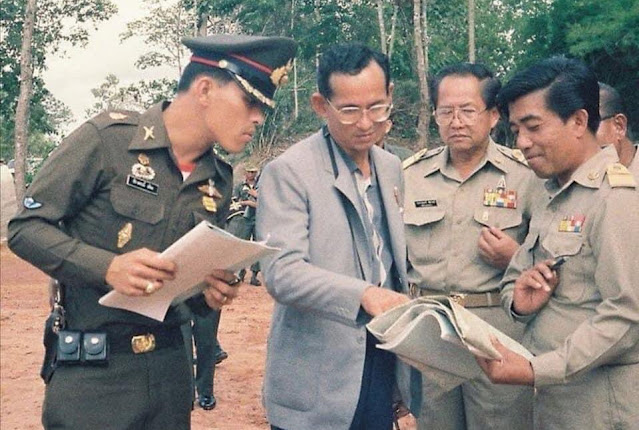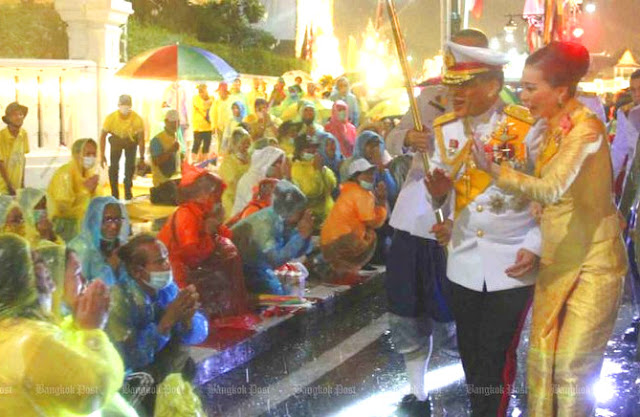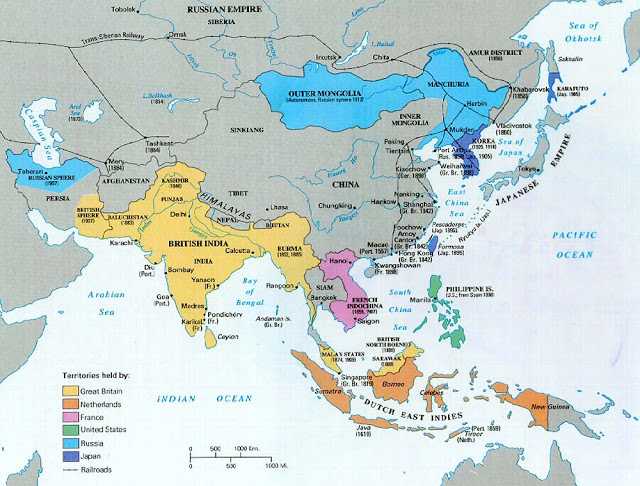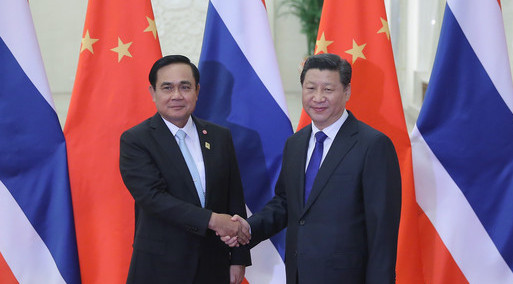Rumors and lies regarding Thailand's monarchy are made by Thailand's enemies specifically because it is unlike Western monarchies, and specifically because the West seeks to end it.
Thai Summary (English version below): สถาบันพระมหากษัตริย์ของไทยไม่ใช่สถาบันกษัตริย์แบบตะวันตก ฝ่ายที่ไม่ชอบราชาธิปไตย คลั่งไคล้ตะวันตก เเพร่สะพัดข่าวลือและข่าวปลอมเกี่ยวกับสถาบันพระมหากษัตริย์ของไทย ให้เสื่อมพระเกียรติเพื่อล้มสถาบัน ประเทศไทยมีประวัติศาสตร์ยาวนาน เป็นประเทศที่มีอำนาจทางการเมือง การทหาร และเศรษฐกิจที่สำคัญในเอเชียตะวันออกเฉียงใต้ เเละเป็นเพียงชาติเดียวในภูมิภาคที่ไม่ตกเป็นอาณานิคมของมหาอำนาจในยุโรป สิ่งเหล่านี้เกิดขึ้นได้ด้วยความสมัครสมานสามัคคีของคนในชาติ ภายใต้การนำของพระมหากษัตริย์ผู้เป็นองค์ประมุขของประเทศ ดังนั้นสถาบันกษัตริย์ไทยจึงเป็นอุปสรรคสำคัญสำหรับชาติตะวันตกที่ต้องการเข้ามาครอบงำไทย ความพยายามในการโค่นล้มสถาบันกษัตริย์ไทยมีมานานหลายทศวรรษ ทั้งการโฆษณาชวนเชื่อ ข่าวปลอม ข่าวใส่ร้ายเพื่อให้ราชวงศ์เสื่อมเสีย เพื่อให้ประชาชนขาดศรัทธา ขาดความจงรักภักดี หากสิ้นสถาบันกษัตริย์ ประชาชนในชาติเเตกความสามัคคี ประเทศชาติย่อมสั่นคลอนง่ายต่อการครอบครอง
October 20, 2020 (Tony Cartalucci - LD) - The first fatal mistake Western observers make when attempting to describe Thailand's monarchy is superficially comparing it to European, or worse yet, Arabian institutions. It is neither.
Thailand, a nation of nearly 70 million people, despite appearing "archaic" or "conservative" has universal healthcare, state housing, social programs, and state-owned enterprises with unions. It has modern infrastructure and is one of the most developed nations in Southeast Asia.
Thailand is a significant political, military, and economic power in Southeast Asia, remaining the only nation in the region to avoid colonization by European powers. It managed this through the leadership of its monarchs and the unity they have historically fostered throughout Thai history.
The Thai Monarchy
Thailand's monarchy - officially a constitutional monarchy - stretches back seven centuries, with the current dynasty reigning for over 230 years. It has developed and currently rules as a uniquely Thai institution with its own history and its own social contract with the Thai people.
Contrary to disinformation spread by the increasingly discredited Western media and the circles of lobbyists that have infiltrated and tainted their ranks, the reverence, loyalty, and respect Thai people view this institution with is real.

The most accurate comparison to make between Thailand's monarchy and any given Western equivalent, would not be with a European monarchy, but with Western "founding fathers."
Thailand's monarchy over the centuries, made critical reforms to improve life within Thailand, and bolster the nation's competitive edge regionally and internationally. It was the Thai monarchy under the reign King Rama V (1868-1910) that ultimately abolished slavery - without the necessity of a civil war as seen in the US. It was also King Rama V who ushered in modern technology and administrative reforms.
The late King Bhumibol Adulyadej spent his seventy years as Thailand's head of state fostering national unity amid a region immersed in divisive war. He also worked for decades to create socioeconomic and political self-sufficiency, recognizing the predatory nature of the International Monetary Fund (IMF) and the dangers of becoming economically dependent on foreign institutions.
He was also a champion of localization, organic farming, and self-reliance as well as economic diversification for farmers as a means of weathering fluctuating market prices both within Thailand's borders and beyond them.
Considering this, and the fact that the West's "international order" is predicated on corporate-financier monopolies and centralized "globalization" - the antithesis of what Thailand's head of state promoted for decades - it is no wonder the West's various institutions and media fronts attempted to undermine and overthrow the monarchy throughout history.
With King Bhumibol Adulyadej's passing, he left behind him a myriad of official and unofficial institutions, organizations, and national networks dedicated to carrying on his work. He also leaves his successor, King Maha Vajiralongkorn who has continued this work - and is now the new target of Western subversion.
Who is the King of Thailand?
King Maha Vajiralongkorn is a trained jet fighter and jet liner pilot who served in Thailand's armed forces, taking part in both air and ground combat operations along Thailand's borders. He has since carried out public duties including presiding over opening ceremonies, university graduations, and other public functions as is expected of the institution.

Because his public service to Thailand is impeccable, Western interests seeking to undermine and overthrow the vital institution he represents have resorted to personal attacks based on unfounded rumors - as they have done with all national leaders and prominent figures impeding Western interests, worldwide.
Despite this superficial attack focused on the King himself, Thailand's monarchy represents more than a single individual. It also represents a circle of experienced, skilled advisers, and overall, a wider institution with centuries of history, culture, a social contract, and the unity of the Thai people behind it.
It would be an egregious miscalculation to indulge in Western propaganda rather than rationally map out the current and likely future political landscape of Thailand, one that will be dominated by figures close to the life's work of King Maha Vajiralongkorn's father, as well as figures pragmatic and in tune with the regional shift away from American hegemony, toward a more independent Asia.
Where Thailand Fits in Today - Not During the Cold War
While Thailand played a role in Washington's war with Vietnam decades ago - it was a pragmatic relationship aimed at saving the nation from the same destruction suffered by Vietnam, Laos, and Cambodia. Since then - Thailand has incrementally pivoted East.
Today - the Thai government, military, monarchy, and many of the nation's largest businesses have shifted the nation closer to China despite immense pressure from the US and Europe.
China is now Thailand's largest trading partner, investor, source of tourism, arms supplier, and a key partner in major infrastructure projects including Thailand's rollout of 5G technology and a high-speed railway that will eventually connect the Kingdom of Thailand to China via Laos.
Aside from slander and rumors peddled by Thailand's enemies - foreign and domestic - there is nothing of substance for Thailand's critics to say regarding the monarchy. Even protesters now complaining about "taxes" being used on the King - who serves as head of state - complain without facts in hand.
In reality - Thailand's national budget allots only 0.27% for the King. For the military - also a target of Thailand's enemies - only 6.9% of the national budget goes to defense spending - or about 1.35% of Thailand's GDP - well below the global average of 2.2%.
For Western propagandists who insist the Thai King is "unpopular" and will bring to an end Thailand's seven century-old institution, it should be remembered that their "predictions" are part of a wider propaganda campaign, not legitimate, fact-based analysis.
These same media organizations and "experts" predicted a "civil war" erupting in Thailand in 2013-2014, and even suggested that the capital of the nation would shift from Bangkok to the northern city of Chiang Mai 680 km away - absurd predictions that never even remotely materialized and upon closer analysis, never could have.
The West is retreating from its position as global hegemon specifically because of a crisis of credibility and the way it deals with developing nations and emerging centers of global power.
For nations and people seeking to establish a new, multipolar world order built upon something more sustainable and equitable, it is essential they avoid the same type of superficial and judgemental conclusions made by the West regarding another nation's chosen system of government - especially when based on a nation's history and culture.
Semantics and superficial analysis must be avoided. Other nations resisting Western aggression and interference - like Syria - have leaders who inherited their power and positions. All nations - including Russia and China - are ruled by respective circles of their most powerful and influential interests. A nation therefore must be judged by the merit of their actions upon the global stage - not by superficial and mostly meaningless ideological labels.
Thailand possesses a powerful, independent military and a constitutional monarchy. Together with the current government, they have pivoted the nation East and embraced China's rise upon the global stage.
That is why Thailand's military and monarchy are hated by the West. That is why lies are spread targeting both.





